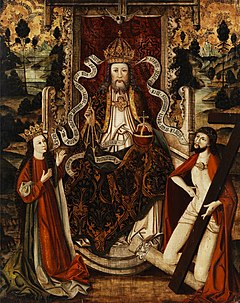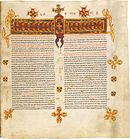Christian eschatology is a minor branch of study within Christian theology which deals with the doctrine of the "last things", especially the Second Coming of Christ, or Parousia. Eschatology – the word derives from two Greek roots meaning "last" (ἔσχατος) and "study" (-λογία) – involves the study of "end things", whether of the end of an individual life, of the end of the age, of the end of the world, or of the nature of the Kingdom of God. Broadly speaking, Christian eschatology focuses on the ultimate destiny of individual souls and of the entire created order, based primarily upon biblical texts within the Old and New Testaments. Christian eschatology looks to study and discuss matters such as death and the afterlife, Heaven and Hell, the Second Coming of Jesus, the resurrection of the dead, the rapture, the tribulation, millennialism, the end of the world, the Last Judgment, and the New Heaven and New Earth in the world to come.

Eschatology concerns expectations of the end of the present age, human history, or the world itself. The end of the world or end times is predicted by several world religions, which teach that negative world events will reach a climax. Belief that the end of the world is imminent is known as apocalypticism, and over time has been held both by members of mainstream religions and by doomsday cults. In the context of mysticism, the term refers metaphorically to the end of ordinary reality and to reunion with the divine. Religions treat eschatology as a future event prophesied in sacred texts or in folklore. While other religions may have concepts of renewal or transformation after significant events, the explicit description of a new earth is primarily found in Christian teachings within the context of eschatology, this description can be found in Chapter 21 of the Book of Revelation.

The Gospel of Mark is the second of the four canonical gospels and one of the three synoptic Gospels. It tells of the ministry of Jesus from his baptism by John the Baptist to his death, the burial of his body, and the discovery of his empty tomb. It portrays Jesus as a teacher, an exorcist, a healer, and a miracle worker, though it does not mention a miraculous birth or divine pre-existence. He refers to himself as the Son of Man. He is called the Son of God but keeps his messianic nature secret; even his disciples fail to understand him. All this is in keeping with the Christian interpretation of prophecy, which is believed to foretell the fate of the messiah as suffering servant.
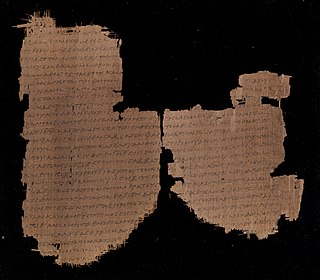
The Gospel of Luke tells of the origins, birth, ministry, death, resurrection, and ascension of Jesus Christ. Together with the Acts of the Apostles, it makes up a two-volume work which scholars call Luke–Acts, accounting for 27.5% of the New Testament. The combined work divides the history of first-century Christianity into three stages, with the gospel making up the first two of these – the life of Jesus the Messiah from his birth to the beginning of his mission in the meeting with John the Baptist, followed by his ministry with events such as the Sermon on the Plain and its Beatitudes, and his Passion, death, and resurrection.

The Gospel of Matthew is the first book of the New Testament of the Bible and one of the three synoptic Gospels. It tells how Israel's Messiah, Jesus, comes to his people but is rejected by them and how, after his resurrection, he sends the disciples to the gentiles instead. Matthew wishes to emphasize that the Jewish tradition should not be lost in a church that was increasingly becoming gentile. The gospel reflects the struggles and conflicts between the evangelist's community and the other Jews, particularly with its sharp criticism of the scribes and Pharisees with the position that through their rejection of Christ, the Kingdom of God has been taken away from them and given instead to the church.

The Gospel of John is the fourth of the four canonical gospels in the New Testament. It contains a highly schematic account of the ministry of Jesus, with seven "signs" culminating in the raising of Lazarus and seven "I am" discourses culminating in Thomas' proclamation of the risen Jesus as "my Lord and my God". The gospel's concluding verses set out its purpose, "that you may believe that Jesus is the Christ, the Son of God, and that believing you may have life in his name."

The Lord's Prayer, also known by its incipit Our Father, is a central Christian prayer that Jesus taught as the way to pray. Two versions of this prayer are recorded in the gospels: a longer form within the Sermon on the Mount in the Gospel of Matthew, and a shorter form in the Gospel of Luke when "one of his disciples said to him, 'Lord, teach us to pray, as John taught his disciples'". Regarding the presence of the two versions, some have suggested that both were original, the Matthean version spoken by Jesus early in his ministry in Galilee, and the Lucan version one year later, "very likely in Judea".

The Sermon on the Mount is a collection of sayings spoken by Jesus of Nazareth found in the Gospel of Matthew that emphasizes his moral teachings. It is the first of five discourses in the Gospel and has been one of the most widely quoted sections of the Gospels.

The Jesus Seminar was a group of about 50 biblical criticism scholars and 100 laymen founded in 1985 by Robert Funk that originated under the auspices of the Westar Institute. The seminar was very active through the 1980s and 1990s, and into the early 21st century.

In Christianity, Jesus is the Son of God as chronicled in the Bible's New Testament, and in most Christian denominations he is held to be God the Son, a prosopon (Person) of the Trinity of God.
The concept of the kingship of God appears in all Abrahamic religions, where in some cases the terms kingdom of God and kingdom of Heaven are also used. The notion of God's kingship goes back to the Hebrew Bible, which refers to "his kingdom" but does not include the term "Kingdom of God".

Apocalypticism is the religious belief that the end of the world is imminent, even within one's own lifetime. This belief is usually accompanied by the idea that civilization will soon come to a tumultuous end due to some sort of catastrophic global event.

Jesus, also referred to as Jesus Christ, Jesus of Nazareth, and many other names and titles, was a first-century Jewish preacher and religious leader. He is the central figure of Christianity, the world's largest religion. Most Christians believe Jesus to be the incarnation of God the Son and the awaited messiah, the Christ that is prophesied in the Old Testament.
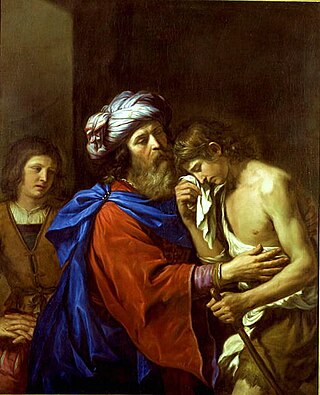
The parables of Jesus are found in the Synoptic Gospels and some of the non-canonical gospels. They form approximately one third of his recorded teachings. Christians place great emphasis on these parables, which they generally regard as the words of Jesus.

In Christianity, God is believed to be the eternal, supreme being who created and preserves all things. Most Christians believe in a monotheistic, trinitarian conception of God, which is both transcendent and immanent. Most Christians believe in a singular God that exists in a Trinity, which consists of three persons: God the Father, God the Son, and God the Holy Spirit. Christian teachings on the transcendence, immanence, and involvement of God in the world and his love for humanity exclude the belief that God is of the same substance as the created universe but accept that God the Son assumed hypostatically united human nature, thus becoming man in a unique event known as "the Incarnation".
This is a glossary of terms used in Christianity.
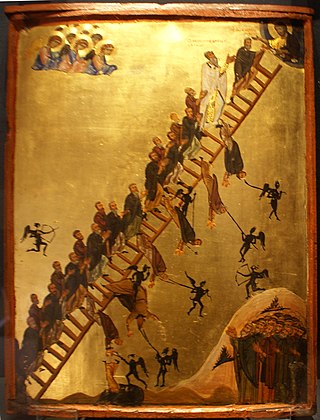
Eternal life traditionally refers to continued life after death, as outlined in Christian eschatology. The Apostles' Creed testifies: "I believe... the resurrection of the body, and life everlasting." In this view, eternal life commences after the second coming of Jesus and the resurrection of the dead, although in the New Testament's Johannine literature there are references to eternal life commencing in the earthly life of the believer, possibly indicating an inaugurated eschatology.
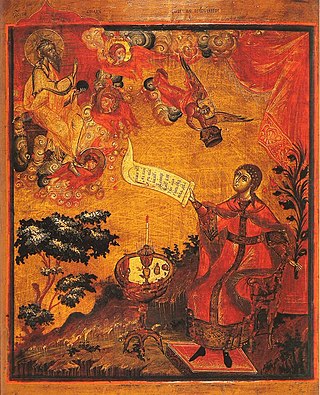
The Kingdom of God has different meanings in different Christian denominations and they interpret its meaning in distinctly different ways. While the concept of Kingdom of God may have an intuitive meaning to lay Christians, there is hardly any agreement among theologians about its meaning in the New Testament, and it is often interpreted to fit the theological agenda of those interpreting it.
Kingdom of heaven is a phrase used in the Gospel of Matthew. It is generally seen as equivalent to the phrase "kingdom of God" in the Gospel of Mark and the Gospel of Luke. Thought to be the main content of Jesus's preaching in the Gospel of Matthew, the "kingdom of heaven" described "a process, a course of events, whereby God begins to govern or to act as king or Lord, an action, therefore, by which God manifests his being-God in the world of men."
Scholars have given various interpretations of the elements of the Gospel stories.
